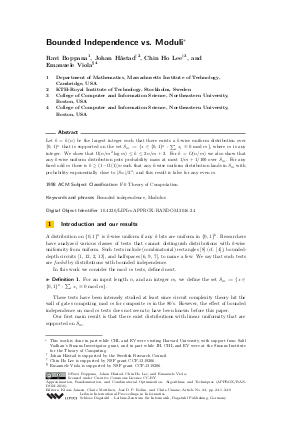Bounded Independence vs. Moduli
Authors Ravi Boppana, Johan Håstad, Chin Ho Lee, Emanuele Viola
-
Part of:
Volume:
Approximation, Randomization, and Combinatorial Optimization. Algorithms and Techniques (APPROX/RANDOM 2016)
Part of: Series: Leibniz International Proceedings in Informatics (LIPIcs)
Part of: Conference: International Conference on Randomization and Computation (RANDOM)
Part of: Conference: International Conference on Approximation Algorithms for Combinatorial Optimization Problems (APPROX) - License:
 Creative Commons Attribution 3.0 Unported license
Creative Commons Attribution 3.0 Unported license
- Publication Date: 2016-09-06
File

PDF
LIPIcs.APPROX-RANDOM.2016.24.pdf
- Filesize: 477 kB
- 9 pages
Document Identifiers
Subject Classification
Keywords
- Bounded independence
- Modulus
Metrics
- Access Statistics
-
Total Accesses (updated on a weekly basis)
0Document
0Metadata
Abstract
Let k = k(n) be the largest integer such that there exists a k-wise uniform distribution over {0,1}^n that is supported on the set S_m := {x in {0,1}^n: sum_i x_i equiv 0 mod m}, where m is any integer. We show that Omega(n/m^2 log m) <= k <= 2n/m + 2. For k = O(n/m) we also show that any k-wise uniform distribution puts probability mass at most 1/m + 1/100 over S_m. For any fixed odd m there is k \ge (1 - Omega(1))n such that any k-wise uniform distribution lands in S_m with probability exponentially close to |S_m|/2^n; and this result is false for any even m.
Cite As Get BibTex
Ravi Boppana, Johan Håstad, Chin Ho Lee, and Emanuele Viola. Bounded Independence vs. Moduli. In Approximation, Randomization, and Combinatorial Optimization. Algorithms and Techniques (APPROX/RANDOM 2016). Leibniz International Proceedings in Informatics (LIPIcs), Volume 60, pp. 24:1-24:9, Schloss Dagstuhl – Leibniz-Zentrum für Informatik (2016)
https://doi.org/10.4230/LIPIcs.APPROX-RANDOM.2016.24
BibTex
@InProceedings{boppana_et_al:LIPIcs.APPROX-RANDOM.2016.24,
author = {Boppana, Ravi and H\r{a}stad, Johan and Lee, Chin Ho and Viola, Emanuele},
title = {{Bounded Independence vs. Moduli}},
booktitle = {Approximation, Randomization, and Combinatorial Optimization. Algorithms and Techniques (APPROX/RANDOM 2016)},
pages = {24:1--24:9},
series = {Leibniz International Proceedings in Informatics (LIPIcs)},
ISBN = {978-3-95977-018-7},
ISSN = {1868-8969},
year = {2016},
volume = {60},
editor = {Jansen, Klaus and Mathieu, Claire and Rolim, Jos\'{e} D. P. and Umans, Chris},
publisher = {Schloss Dagstuhl -- Leibniz-Zentrum f{\"u}r Informatik},
address = {Dagstuhl, Germany},
URL = {https://drops.dagstuhl.de/entities/document/10.4230/LIPIcs.APPROX-RANDOM.2016.24},
URN = {urn:nbn:de:0030-drops-66475},
doi = {10.4230/LIPIcs.APPROX-RANDOM.2016.24},
annote = {Keywords: Bounded independence, Modulus}
}
Author Details
References
-
Louay M. J. Bazzi. Polylogarithmic independence can fool DNF formulas. SIAM J. Comput., 38(6):2220-2272, 2009.

-
Mark Braverman. Polylogarithmic independence fools AC^0 circuits. J. of the ACM, 57(5), 2010.

-
Neal Carothers. A short course on approximation theory. Available at http://personal.bgsu.edu/∼carother/Approx.html.

- Suresh Chari, Pankaj Rohatgi, and Aravind Srinivasan. Improved algorithms via approximations of probability distributions. J. Comput. System Sci., 61(1):81-107, 2000. URL: http://dx.doi.org/10.1006/jcss.1999.1695.
-
E. Cheney. Introduction to approximation theory. McGraw-Hill, New York, New York, 1966.

-
Ilias Diakonikolas, Parikshit Gopalan, Ragesh Jaiswal, Rocco A. Servedio, and Emanuele Viola. Bounded independence fools halfspaces. SIAM J. on Computing, 39(8):3441-3462, 2010.

-
Ilias Diakonikolas, Daniel Kane, and Jelani Nelson. Bounded independence fools degree-2 threshold functions. In 51th IEEE Symp. on Foundations of Computer Science (FOCS). IEEE, 2010.

-
Guy Even, Oded Goldreich, Michael Luby, Noam Nisan, and Boban Velickovic. Efficient approximation of product distributions. Random Struct. Algorithms, 13(1):1-16, 1998.

-
Parikshit Gopalan, Ryan O'Donnell, Yi Wu, and David Zuckerman. Fooling functions of halfspaces under product distributions. In 25th IEEE Conf. on Computational Complexity (CCC), pages 223-234. IEEE, 2010.

- Chin Ho Lee and Emanuele Viola. Some limitations of the sum of small-bias distributions. Available at http://www.ccs.neu.edu/home/viola/, 2015.
-
Raghu Meka and David Zuckerman. Small-bias spaces for group products. In 13th Workshop on Randomization and Computation (RANDOM), volume 5687 of Lecture Notes in Computer Science, pages 658-672. Springer, 2009.

-
Alexander A. Razborov. A simple proof of Bazzi’s theorem. ACM Transactions on Computation Theory (TOCT), 1(1), 2009.

-
Avishay Tal. Tight bounds on The Fourier Spectrum of AC⁰. Electronic Colloquium on Computational Complexity, Technical Report TR14-174, 2014.

- L. Richard Turner. Inverse of the Vandermonde matrix with applications, 1966. NASA technical note D-3547 available at URL: http://ntrs.nasa.gov/archive/nasa/casi.ntrs.nasa.gov/19660023042.pdf.
-
Emanuele Viola and Avi Wigderson. Norms, XOR lemmas, and lower bounds for polynomials and protocols. Theory of Computing, 4:137-168, 2008.

